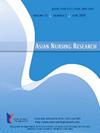接受计划拔管的呼吸机替代者在再插管方面的决策自我效能和决策冲突。
IF 2.1
3区 医学
Q2 NURSING
引用次数: 0
摘要
目的:尽管医疗决策过程对一些代孕者来说可能是压倒性的,但他们对自己的经历缺乏了解。本研究的目的是检验重症监护室(ICU)中的代理人在计划拔管后是否为呼吸衰竭患者重新插管的决策时所经历的决策自我效能和决策冲突。此外,还确定了影响这些决策过程的预测因素和中介因素。方法:本研究采用横断面设计,调查了174名代孕者的决策过程,这些代孕者在2021年8月至2022年2月期间,在医疗中心的内部ICU计划拔管后,面临是否为呼吸衰竭患者重新插管的决定。采用结构化问卷收集代孕者的背景信息、决策自我效能感、决策冲突以及积极和消极影响等数据。还收集了患者的背景信息。对数据进行单变量和多变量分析建模。结果:代理人的平均决策自我效能感得分为82.41分,20.7%的代理人的决策冲突得分超过37.5分,表明他们在决策过程中面临挑战。代孕者的就业状况和负面影响对其决策自我效能感有显著预测作用。此外,患者住院前的日常生活活动和代理人的决策自我效能感显著预测了代理人的决策冲突。代孕者的负面情绪对决策冲突的影响完全由决策自我效能感介导。结论:代孕者决策自我效能介导了负面情绪与决策冲突的关系。提供专注于增强替代自我效能和减少负面影响的临床护理干预措施有助于缓解这一人群的决策冲突。本文章由计算机程序翻译,如有差异,请以英文原文为准。
Decision Self-Efficacy and Decisional Conflict on Reintubation among Surrogates of Ventilated Patients Undergoing Planned Extubation
Purpose
Although the medical decision-making process can be overwhelming for some surrogates, there is a lack of understanding regarding their experiences. The objectives of this study were to examine the decision self-efficacy and decisional conflict experienced by surrogates in intensive care units (ICUs) when faced with the decision of whether to reintubate patients with respiratory failure after a planned extubation. In addition, predictors and mediators influencing these decision-making processes were identified.
Methods
This study utilized a cross-sectional design to investigate the decision-making processes of 174 surrogates who were faced with the decision of whether to reintubate patients with respiratory failure after a planned extubation in the internal ICU of a medical center between August 2021 and February 2022. Structured questionnaires were administered to collect data on the surrogates' background information, decision self-efficacy, decisional conflict, and positive and negative affect. The patients’ background information was also collected. Univariate and multivariate analyses were performed to model the data.
Results
The mean decision self-efficacy score of the surrogates was 82.41 points, and 20.7% surrogates had decisional conflict scores exceeding 37.5 points, suggesting that they faced challenges in the decision-making process. Surrogates' employment status and negative affect significantly predicted their decision self-efficacy. In addition, patients' activities of daily living prior to hospitalization and the decision self-efficacy of the surrogate significantly predicted surrogate decisional conflict. The impact of surrogates’ negative affect on decisional conflict was fully mediated by decision self-efficacy.
Conclusions
Surrogate decision self-efficacy mediates the relationship between negative affect and decisional conflict. Providing clinical care interventions that focus on enhancing surrogate self-efficacy and reducing negative affect can help alleviate decisional conflict in this population.
求助全文
通过发布文献求助,成功后即可免费获取论文全文。
去求助
来源期刊

Asian Nursing Research
NURSING-
CiteScore
4.20
自引率
4.50%
发文量
32
审稿时长
45 days
期刊介绍:
Asian Nursing Research is the official peer-reviewed research journal of the Korean Society of Nursing Science, and is devoted to publication of a wide range of research that will contribute to the body of nursing science and inform the practice of nursing, nursing education, administration, and history, on health issues relevant to nursing, and on the testing of research findings in practice.
 求助内容:
求助内容: 应助结果提醒方式:
应助结果提醒方式:


